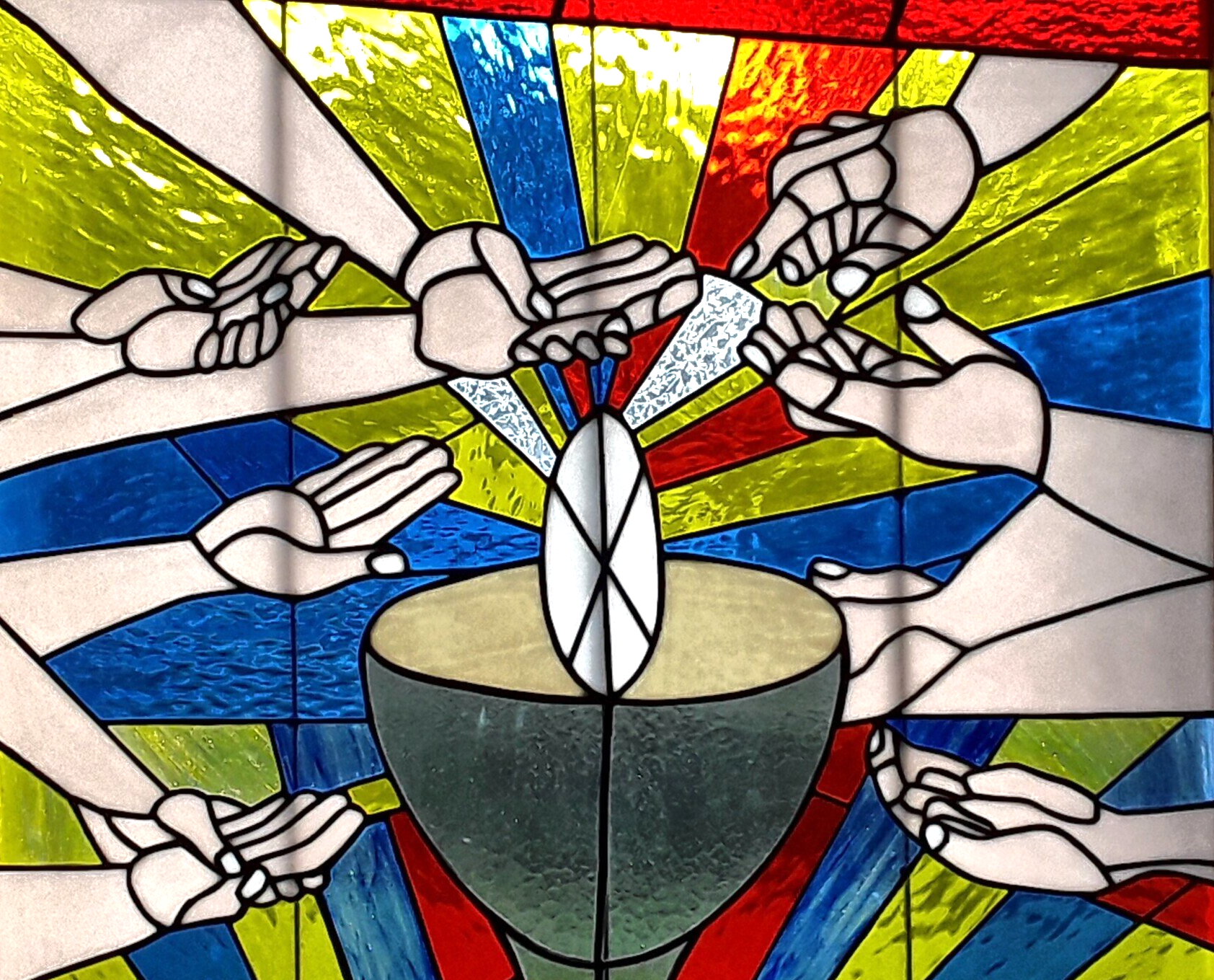The Sacraments
Sacraments . . . [are] sure witnesses, and effectual signs of grace, and God’s good will toward us, by the which he doth work invisibly in us, and doth not only quicken, but also strengthen and confirm our Faith in him.
There are two Sacraments ordained of Christ our Lord in the Gospel, that is to say, Baptism, and the Supper of the Lord.
—XXV Article of Religion, The Book of Common Prayer 1979
Holy Baptism
“Baptism is the beginning of the Christian life, not the substitute for it.”
—E.L. Mascall, Christ, the Christian, & the Church
Baptism is the sacrament of new birth, of regeneration into the life of Jesus Christ, applying his once-and-for-all saving work to the individual believer. The form of baptism was established by Jesus, who commanded his disciples to “make disciples of all nations, baptizing them in the name of the Father and of the Son and of the Holy Spirit.”
In addition to baptizing adult converts to the faith of Jesus, we also encourage the baptism of children whose parents are believing Christians and active members of a local church.
Baptism is not “fire insurance.” Those who are baptized, and the parents of baptized children, have a sacred responsibility to continue in the Christian faith and life, and to raise their children to do the same.
Do we accept baptisms of other churches?
As a church within Christ’s one, holy, catholic, and apostolic Church, we recognize any baptism administered with water according to Jesus’s command. The only exceptions would be the baptisms of false churches and cults who deny the catholic faith in the Holy Trinity as expressed in the Apostles’ Creed; or baptisms administered using invalid actions or words other than those ordained by Christ. Ordinarily, baptism is not to be repeated. However, where there is serious doubt as to the validity of a person’s prior baptism, a form of conditional baptism is available.
What about “Holy Spirit baptism”?
Our church does not teach that Christians are to expect a second “baptism in the Holy Spirit.” The Holy Spirit is given to all Christians in their baptism. However, the gift of the Holy Spirit within the believer is to be cultivated and confirmed through prayer, study of the Scriptures, and faithful participation in the sacramental life and fellowship of the Church. Learn more about the rite of “Confirmation” below.
Do you want to be baptized?
If you are seeking baptism for yourself or your child, speak to Fr. Schellhase or contact the church office. Occasions that are especially suitable for baptisms include the Easter Vigil, the Day of Pentecost, All Saints’ Day, and the Baptism of our Lord.
If you attend another Christian church, please speak with your own pastors about baptism. Ordinarily we do not baptize the children of parents who are not members of this parish. If your church does not practice the baptism of infants, this may be an opportunity for a conversation. Fr. Schellhase is happy to discuss all such matters.
Holy Communion
Holy Communion is the sacrament of bread and wine by which Christians receive from Jesus Christ the gift of his Body and Blood to sustain us in our spiritual life.
As the sacrament of Baptism is necessary to make Christians, so the sacrament of Holy Communion is necessary to preserve them. It is through this sacrament, received through the ministry of the Church, that Christians continue to participate in Christ, in the fellowship of his Body, the communion of all faithful believers, and to receive the grace they require for continued repentance and walking with God.
At St. Michael’s, we invite all baptized Christians to share with us in this sacrament.

Other sacramental rites
Q. What other sacramental rites evolved in the Church under the guidance of the Holy Spirit?
A. Other sacramental rites which evolved in the Church include confirmation, ordination, holy matrimony, reconciliation of a penitent, and unction.
Q. How do they differ from the two sacraments of the Gospel?
A. Although they are means of grace, they are not necessary for all persons in the same way that Baptism and the Eucharist are.
—Catechism, The Book of Common Prayer 1979
Confirmation
“In the course of their Christian development, those baptized at an early age are expected, when they are ready and have been duly prepared, to make a mature public affirmation of their faith and commitment to the responsibilities of their Baptism and to receive the laying on of hands by the bishop.
“Those baptized as adults, unless baptized with laying on of hands by a bishop, are also expected to make a public affirmation of their faith and commitment to the responsibilities of their Baptism in the presence of a bishop and to receive the laying on of hands.”
—The Book of Common Prayer, 1979
The sacrament of Confirmation, like Baptism, is not ordinarily to be repeated, as it conveys a particular grace of the Holy Spirit. Those joining the Episcopal Church who have already been confirmed by the laying on of hands by a Bishop in another Church, may instead be received by a Bishop of this church in acknowledgement of the sacrament of Confirmation already given. Others who have previously been baptized and confirmed may also wish to reaffirm their baptismal vows in the presence of the Bishop. Speak with Fr. Schellhase if you would like to know about upcoming opportunities for Confirmation, Reception, and Reaffirmation of Baptismal Vows.
Holy Matrimony
“. . . is an honorable estate, instituted of God in the time of man’s innocency, signifying unto us the mystical union that is betwixt Christ and his Church; which holy estate Christ adorned and beautified with his presence, and first miracle that he wrought, in Cana of Galilee; and is commended of St. Paul to be honorable among all men: and is therefore not to be enterprised, nor taken in hand, unadvisedly, lightly, or wantonly, to satisfy men’s carnal lusts and appetites, like brute beasts that have no understanding; but reverently, discreetly, advisedly, soberly, and in the fear of God; duly considering the causes for which Matrimony was ordained.
“First, it was ordained for the procreation of children, to be brought up in the fear and nurture of the Lord, and to the praise of his holy Name.
“Secondly, it was ordained as a remedy against sin, and to avoid fornication; that such persons as have not the gift of continency might marry, and keep themselves undefiled members of Christ’s body.
“Thirdly, it was ordained for the mutual society, help, and comfort that the one ought to have of the other, both in prosperity and adversity.”
—The Book of Common Prayer, 1662
Those who seek to marry should be a man and woman, not previously married, active members of this parish, who have received instruction from the priest and undergone a program of premarital counseling. If you are considering a calling to Holy Matrimony, or have recently become engaged, speak with Fr. Schellhase as soon as possible.
Reconciliation of a Penitent
“The ministry of reconciliation, which has been committed by Christ to his Church, is exercised through the care each Christian has for others, through the common prayer of Christians assembled for public worship, and through the priesthood of the Church and its ministers declaring absolution.
“The Reconciliation of a Penitent is available for all who desire it. It is not restricted to times of sickness. Confessions may be heard anytime and anywhere.”
“When the penitent has confessed all serious sins troubling the conscience and has given evidence of true contrition, the priest gives such counsel and encouragement as are needed and pronounces absolution.”
“The content of a confession is not normally a matter of subsequent discussion. The secret of a confession is morally absolute for the confessor, and must under no circumstances be broken.”
—The Book of Common Prayer, 1979
Those who wish Fr. Schellhase to hear their confession privately should contact him directly to arrange for an appropriate and convenient time and place.
Ministration to the Sick
“In case of illness, the Minister of the Congregation is to be notified.” —The Book of Common Prayer, 1979
“Is any among you sick? Let him call for the elders of the church, and let them pray over him, anointing him with oil in the name of the Lord; and the prayer of faith will save the sick man, and the Lord will raise him up; and if he has committed sins, he will be forgiven.” —James 5:14–15 rsv
In case of sickness, immediately contact the church (or Fr. Schellhase directly), especially if the illness is grave or they may be near to death. A priest will visit them at the hospital or in their home. Our Church provides a number of rites for ministering to the sick, including confession and absolution, anointing with oil, and Holy Communion.
While there exists among some a prejudice not to request “last rites” until the patient is practically dead, this is needless and superstitious. Many who are sick and ailing, even if recovery is expected, gain much encouragement and hope from pastoral visitation, which may be repeated as often as it is needed.


